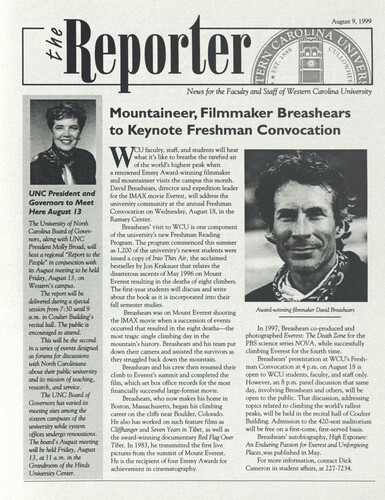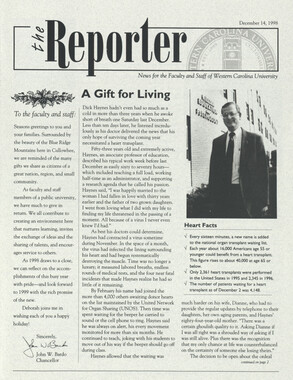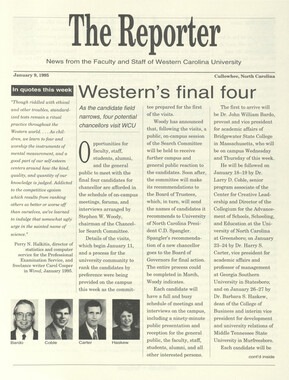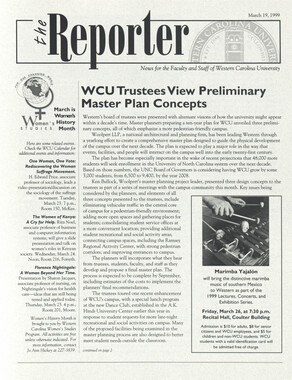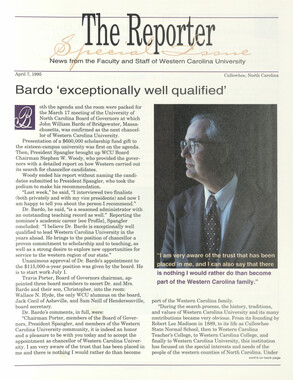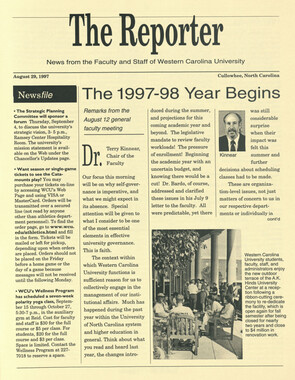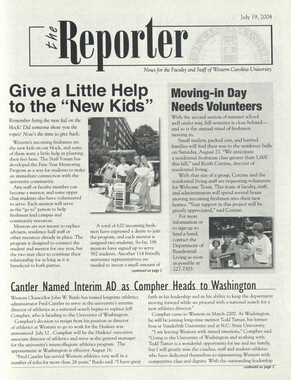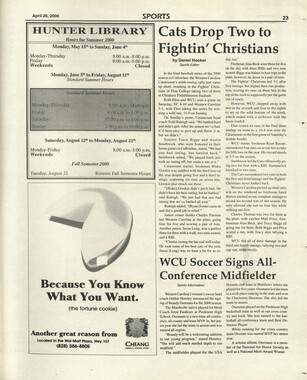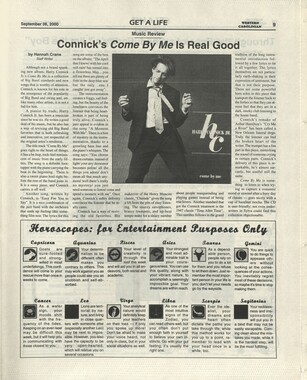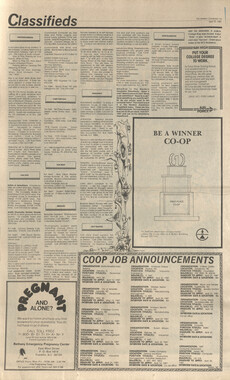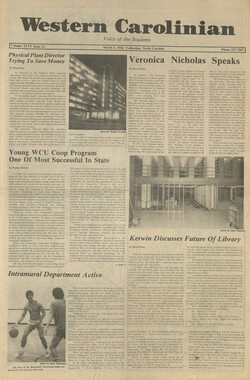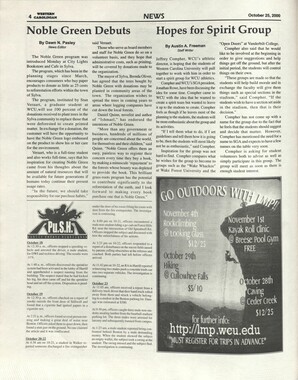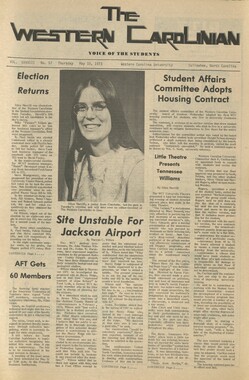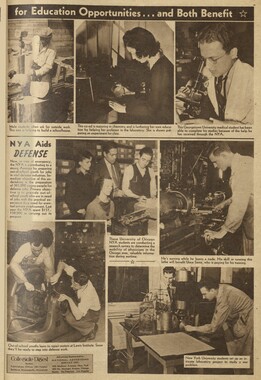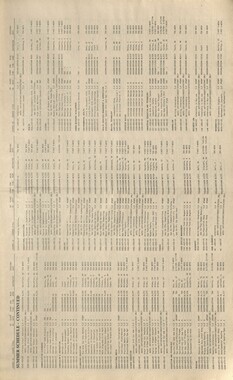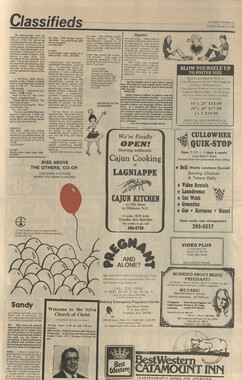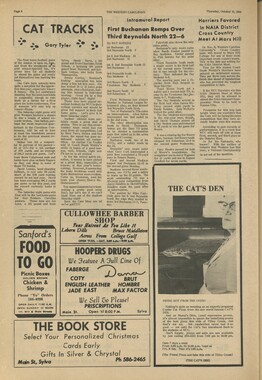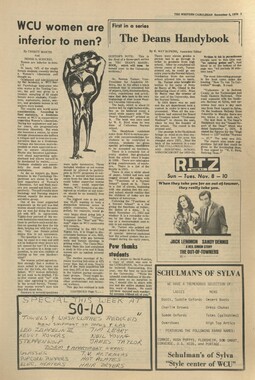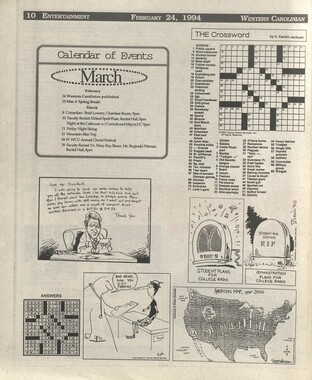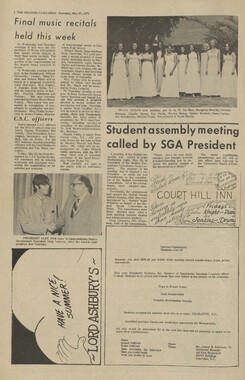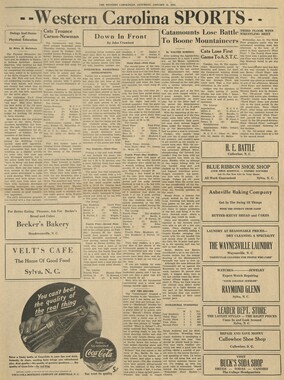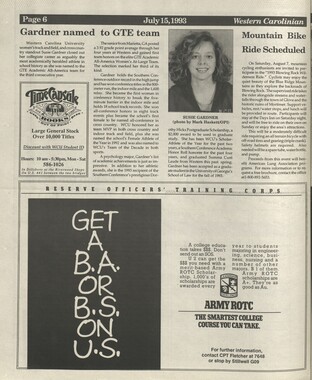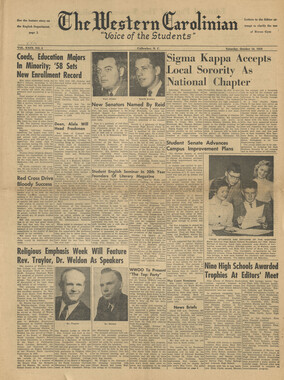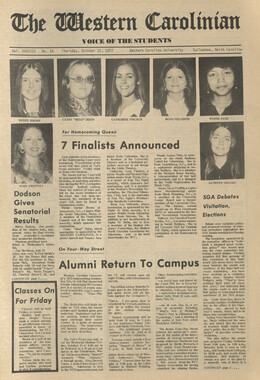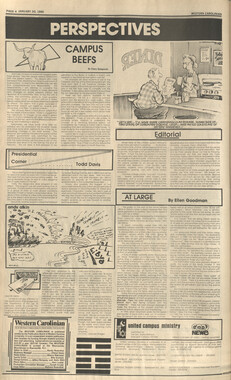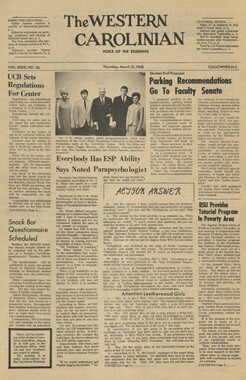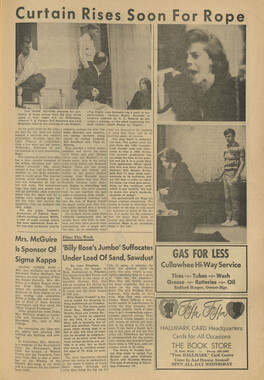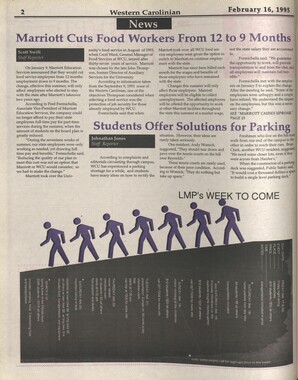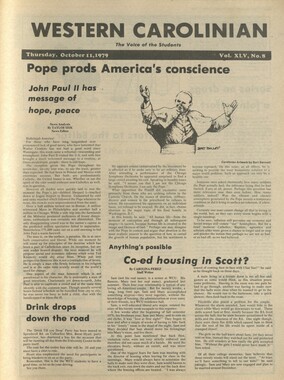Western Carolina University (12)
View all
- Cherokee Traditions (2)
- Craft Revival (23)
- Great Smoky Mountains - A Park for America (17)
- Highlights from Western Carolina University (1)
- Journeys Through Jackson (60)
- LGBTQIA+ Archive of Jackson County (3)
- Oral Histories of Western North Carolina (10)
- Picturing Appalachia (3)
- Western Carolina University Herbarium (5)
- Western Carolina University: Making Memories (18)
- Western Carolina University Publications (379)
- World War II in Southern Appalachia (2)
- Canton Champion Fibre Company (0)
- Civil War in Southern Appalachia (0)
- Horace Kephart (0)
- Stories of Mountain Folk (0)
- Travel Western North Carolina (0)
- Western Carolina University Fine Art Museum Vitreograph Collection (0)
- Western Carolina University Restricted Electronic Theses and Dissertations (0)
- Western North Carolina Regional Maps (0)
University of North Carolina Asheville (0)
View all
- Faces of Asheville (0)
- Forestry in Western North Carolina (0)
- Grove Park Inn Photograph Collection (0)
- Isaiah Rice Photograph Collection (0)
- Morse Family Chimney Rock Park Collection (0)
- Picturing Asheville and Western North Carolina (0)
- North Carolina Park Commission (5)
- Southern Highland Handicraft Guild (1)
- Western Carolina University (379)
- Western Carolina University. Mountain Heritage Center (1)
- Wilburn, Hiram Coleman, 1880-1967 (3)
- Allanstand Cottage Industries (0)
- Appalachian National Park Association (0)
- Bennett, Kelly, 1890-1974 (0)
- Berry, Walter (0)
- Brasstown Carvers (0)
- Cain, Doreyl Ammons (0)
- Carver, George Washington, 1864?-1943 (0)
- Cathey, Joseph, 1803-1874 (0)
- Champion Fibre Company (0)
- Champion Paper and Fibre Company (0)
- Cherokee Indian Fair Association (0)
- Cherokee Language Program (0)
- Crittenden, Lorraine (0)
- Crowe, Amanda (0)
- Edmonston, Thomas Benton, 1842-1907 (0)
- Ensley, A. L. (Abraham Lincoln), 1865-1948 (0)
- Fromer, Irving Rhodes, 1913-1994 (0)
- George Butz (BFS 1907) (0)
- Goodrich, Frances Louisa (0)
- Grant, George Alexander, 1891-1964 (0)
- Heard, Marian Gladys (0)
- Kephart, Calvin, 1883-1969 (0)
- Kephart, Horace, 1862-1931 (0)
- Kephart, Laura, 1862-1954 (0)
- Laney, Gideon Thomas, 1889-1976 (0)
- Masa, George, 1881-1933 (0)
- McElhinney, William Julian, 1896-1953 (0)
- Niggli, Josephina, 1910-1983 (0)
- Osborne, Kezia Stradley (0)
- Owens, Samuel Robert, 1918-1995 (0)
- Penland Weavers and Potters (0)
- Rhodes, Judy (0)
- Roberts, Vivienne (0)
- Roth, Albert, 1890-1974 (0)
- Schenck, Carl Alwin, 1868-1955 (0)
- Sherrill's Photography Studio (0)
- Smith, Edward Clark (0)
- Southern Highlanders, Inc. (0)
- Stalcup, Jesse Bryson (0)
- Stearns, I. K. (0)
- Thompson, James Edward, 1880-1976 (0)
- United States. Indian Arts and Crafts Board (0)
- USFS (0)
- Vance, Zebulon Baird, 1830-1894 (0)
- Weaver, Zebulon, 1872-1948 (0)
- Western Carolina College (0)
- Western Carolina Teachers College (0)
- Whitman, Walt, 1819-1892 (0)
- Williams, Isadora (0)
- Appalachian Region, Southern (23)
- Buncombe County (N.C.) (1)
- Graham County (N.C.) (1)
- Haywood County (N.C.) (15)
- Jackson County (N.C.) (475)
- Macon County (N.C.) (2)
- Mitchell County (N.C.) (2)
- Qualla Boundary (15)
- Asheville (N.C.) (0)
- Avery County (N.C.) (0)
- Blount County (Tenn.) (0)
- Cherokee County (N.C.) (0)
- Clay County (N.C.) (0)
- Great Smoky Mountains National Park (N.C. and Tenn.) (0)
- Henderson County (N.C.) (0)
- Knox County (Tenn.) (0)
- Knoxville (Tenn.) (0)
- Lake Santeetlah (N.C.) (0)
- Madison County (N.C.) (0)
- McDowell County (N.C.) (0)
- Polk County (N.C.) (0)
- Rutherford County (N.C.) (0)
- Swain County (N.C.) (0)
- Transylvania County (N.C.) (0)
- Watauga County (N.C.) (0)
- Waynesville (N.C.) (0)
- Yancey County (N.C.) (0)
- Clippings (information Artifacts) (7)
- Crafts (art Genres) (12)
- Fliers (printed Matter) (2)
- Interviews (24)
- Land Surveys (5)
- Letters (correspondence) (1)
- Manuscripts (documents) (13)
- Maps (documents) (1)
- Newsletters (168)
- Periodicals (60)
- Photographs (24)
- Portraits (1)
- Publications (documents) (286)
- Sound Recordings (22)
- Specimens (5)
- Transcripts (22)
- Video Recordings (physical Artifacts) (5)
- Aerial Photographs (0)
- Aerial Views (0)
- Albums (books) (0)
- Articles (0)
- Artifacts (object Genre) (0)
- Biography (general Genre) (0)
- Cards (information Artifacts) (0)
- Depictions (visual Works) (0)
- Design Drawings (0)
- Drawings (visual Works) (0)
- Envelopes (0)
- Facsimiles (reproductions) (0)
- Fiction (general Genre) (0)
- Financial Records (0)
- Glass Plate Negatives (0)
- Guidebooks (0)
- Internegatives (0)
- Memorandums (0)
- Minutes (administrative Records) (0)
- Negatives (photographs) (0)
- Newspapers (0)
- Occupation Currency (0)
- Paintings (visual Works) (0)
- Pen And Ink Drawings (0)
- Personal Narratives (0)
- Plans (maps) (0)
- Poetry (0)
- Postcards (0)
- Programs (documents) (0)
- Questionnaires (0)
- Scrapbooks (0)
- Sheet Music (0)
- Slides (photographs) (0)
- Speeches (documents) (0)
- Text Messages (0)
- Tintypes (photographs) (0)
- Vitreographs (0)
- Cataloochee History Project (5)
- Horace Kephart Collection (1)
- Mountain Heritage Center Collection (1)
- Samuel Robert Owens Collection (2)
- The Reporter, Western Carolina University (108)
- WCU Gender and Sexuality Oral History Project (10)
- WCU Oral History Collection - Mountain People, Mountain Lives (7)
- WCU Students Newspapers Collection (271)
- A.L. Ensley Collection (0)
- Appalachian Industrial School Records (0)
- Appalachian National Park Association Records (0)
- Axley-Meroney Collection (0)
- Bayard Wootten Photograph Collection (0)
- Bethel Rural Community Organization Collection (0)
- Blumer Collection (0)
- C.W. Slagle Collection (0)
- Canton Area Historical Museum (0)
- Carlos C. Campbell Collection (0)
- Cherokee Studies Collection (0)
- Daisy Dame Photograph Album (0)
- Daniel Boone VI Collection (0)
- Doris Ulmann Photograph Collection (0)
- Elizabeth H. Lasley Collection (0)
- Elizabeth Woolworth Szold Fleharty Collection (0)
- Frank Fry Collection (0)
- George Masa Collection (0)
- Gideon Laney Collection (0)
- Hazel Scarborough Collection (0)
- Hiram C. Wilburn Papers (0)
- Historic Photographs Collection (0)
- Humbard Collection (0)
- Hunter and Weaver Families Collection (0)
- I. D. Blumenthal Collection (0)
- Isadora Williams Collection (0)
- Jesse Bryson Stalcup Collection (0)
- Jim Thompson Collection (0)
- John B. Battle Collection (0)
- John C. Campbell Folk School Records (0)
- John Parris Collection (0)
- Judaculla Rock project (0)
- Kelly Bennett Collection (0)
- Love Family Papers (0)
- Major Wiley Parris Civil War Letters (0)
- Map Collection (0)
- McFee-Misemer Civil War Letters (0)
- Norburn - Robertson - Thomson Families Collection (0)
- Pauline Hood Collection (0)
- Pre-Guild Collection (0)
- Qualla Arts and Crafts Mutual Collection (0)
- R.A. Romanes Collection (0)
- Rosser H. Taylor Collection (0)
- Sara Madison Collection (0)
- Sherrill Studio Photo Collection (0)
- Smoky Mountains Hiking Club Collection (0)
- Stories of Mountain Folk - Radio Programs (0)
- Venoy and Elizabeth Reed Collection (0)
- WCU Mountain Heritage Center Oral Histories (0)
- Western North Carolina Tomorrow Black Oral History Project (0)
- William Williams Stringfield Collection (0)
- Zebulon Weaver Collection (0)
- African Americans (1)
- Artisans (3)
- Cherokee women (1)
- Church buildings (2)
- Civilian Conservation Corps (U.S.) (1)
- College student newspapers and periodicals (279)
- Gender nonconformity (1)
- Great Smoky Mountains National Park (N.C. and Tenn.) (1)
- Maps (3)
- School integration -- Southern States (1)
- World War, 1939-1945 (1)
- Appalachian Trail (0)
- Cherokee art (0)
- Cherokee artists -- North Carolina (0)
- Cherokee language (0)
- Cherokee pottery (0)
- Dams (0)
- Dance (0)
- Education (0)
- Floods (0)
- Folk music (0)
- Forced removal, 1813-1903 (0)
- Forest conservation (0)
- Forests and forestry (0)
- Hunting (0)
- Landscape photography (0)
- Logging (0)
- Mines and mineral resources (0)
- North Carolina -- Maps (0)
- Paper industry (0)
- Postcards (0)
- Pottery (0)
- Railroad trains (0)
- Rural electrification -- North Carolina, Western (0)
- Segregation -- North Carolina, Western (0)
- Slavery (0)
- Sports (0)
- Storytelling (0)
- Waterfalls -- Great Smoky Mountains (N.C. and Tenn.) (0)
- Weaving -- Appalachian Region, Southern (0)
- Wood-carving -- Appalachian Region, Southern (0)
The Reporter, August 1999
-
The Reporter is a publication produced by Western Carolina University featuring news, events, and campus community updates for faculty and staff. The publication began in August of 1970 and continues digitally today. Click on the link in the “Related Mate
-
-
August 9,1999 News the fFora culty and Staff of Western Carolina University Mountaineer, Filmmaker Breashears to Keynote Freshman Convocation UNC President and Governors to /Meet Here August 13 The University of North Carolina Board of Governors, along with UNC President Molly Broad, will host a regional "Report to the People" in conjunction with its August meeting to be held Friday, August 13, on Western's campus. The report will be delivered during a special session from 7:30 until 9 a.m. in Coulter Building's recital hall. The public is encouraged to attend. This will be the second in a series of events designed as forums for discussions with North Carolinians about their public university and its mission of teaching, research, and service. TheUNCBoardof Governors has varied its meeting sites among the sixteen campuses of the university while system offices undergo renovations. The board's August meeting will be held Friday, August 13, at 11 a.m. in the Grandroom of the Hinds University Center. WCU faculty, staff, and students will hear what it's like to breathe the rarefied air of the world's highest peak when a renowned Emmy Award-winning filmmaker and mountaineer visits the campus this month. David Breashears, director and expedition leader for the IMAX movie Everest, will address the university community at the annual Freshman Convocation on Wednesday, August 18, in the Ramsey Center. Breashears' visit to WCU is one component of the university's new Freshman Reading Program. The program commenced this summer as 1,200 of the university's newest students were issued a copy of Into Thin Air, the acclaimed bestseller by Jon Krakauer that relates the disasterous ascents of May 1996 on Mount Everest resulting in the deaths of eight climbers. The first-year students will discuss and write about the book as it is incorporated into their fall semester studies. Breashears was on Mount Everest shooting the IMAX movie when a succession of events occurred that resulted in the eight deaths—the most tragic single climbing day in the mountain's history. Breashears and his team put down their camera and assisted the survivors as they struggled back down the mountain. Breashears and his crew then resumed their climb to Everest's summit and completed the film, which set box office records for the most financially successful large-format movie. Breashears, who now makes his home in Boston, Massachusetts, began his climbing career on the cliffs near Boulder, Colorado. He also has worked on such feature films as CUffhanger and Seven Years in Tibet, as well as the award-winning documentary Red Flag Over Tibet. In 1983, he transmitted the first live pictures from the summit of Mount Everest. He is the recipient of four Emmy Awards for achievement in cinematography. Award-winning filmmaker David Breashears In 1997, Breashears co-produced and photographed Everest: The Death Zone for the PBS science series NOVA, while successfully climbing Everest for the fourth time. Breashears' presentation at WCU's Freshman Convocation at 4 p.m. on August 18 is open to WCU students, faculty, and staff only. However, an 8 p.m. panel discussion that same day, involving Breashears and others, will be open to the public. That discussion, addressing topics related to climbing the world's tallest peaks, will be held in the recital hall of Coulter Building. Admission to the 420-seat auditorium will be free on a first-come, first-served basis. Breashears' autobiography, High Exposure: An Enduring Passion for Everest and Un forgiving Places,was published in May. For more information, contact Dick Cameron in student affairs, at 227-7234. Retiring WCU staff members are congratulated by Vke Chancellor Rich (fourth from right), following the SPA Service Awards luncheon in July (left to right) Shirley B. Smith, Nell B. Hubbell, Yvonne Holland> Mur, Charles Dills, W. Fayne AIdridge, and Carolyn Cabd, Spotlight on Staff Service Retirees • Lynda G. McNeely, student services assistant for the Office of Advising and Retention Services, received the 1999 Recognition Award for Outstanding Support Personnel at the annual service awards luncheon in July. The award, which includes a $1,000 check and a plaque, honors McNeely for her "dependability, cooperative spirit, loyalty, and effectiveness," according to Vice Chancellor for Academic Affairs Richard J. Collings. In her current position for advising and retention services, McNeely responds to student requests for information and provides support for special programs. She is pictured below with Collings and Bob Orr, associate director of the Faculty Center, this year's winner of WCU's Paul A. Reid Distinguished Service Award for Staff. McNeely and Orr are Western's nominees for the Governor's Award for Excellence. • Frederick W. Harrison, retired professor (Biology), was honored at a recent reception commemorating the completion of his monumental fifteen-volume Microscopic Anatomy of Invertebrates and the donation of his research papers to WCU's Hunter Library. Harrison, a resident of Sylva, served as treatise editor of Microscopic Anatomy of Invertebrates, a project that began in 1985 and ended with the publication by John Wiley & Sons of the final volume last February. Colleagues and friends gathered at Hunter Library in June to honor Harrison and his donation to the library's Special Collections of his research materials. • Jennifer Zak-Place has been named to the newly created position of addictions counselor. She joined the staff of the Counseling and Psychological Services Center on August 2. In addition to providing counseling, consultation, outreach and training services for students, she will coordinate the Office of Student Affairs departments and staff in responding to the use and abuse of alcohol and drugs, as well as gambling and computer addictions. Zak-Place received her doctorate in counseling from the State University of New York at Albany. She completed her doctoral internship at the University of Notre Dame Counseling Center. Banners and billboards announced the beginning of a new practice at Western. The first Employee Recognition Week, held this year July 5-9, was designated by Chancellor John W . Bardo as a celebration of the employees who make the university the "best of the best" places to work. The Office of Human Resources spearheaded the planning and coordinated activities including icecream and watermelon socials on the UC lawn, hot dog lunches, and an employee benefits fair. Individual departments rep orted a variety of ways to recognize their employees' contributions, includin g elegant breakfasts, picnics alongside the river, a nd team-building hikes. A highlight of the week was the annual SPA Service Awards Luncheon, which honored ninety-eight employees for their combined 1,210 years of service to the university and the state of North Carolina. Pictured below are some of the honorees. 20 years 25 years WCU staff members with twenty-five years of service to the university are congratulated by Vice Chancellor Richard J. Collings (fifth from right). The honored staff members are (left to right) Harrison M. Frizzcll, Janet D. Childers, Joe H. Ginn, Norma Medford, Annie L. Ball, Kenneth R. Dills, Linda R. Sutton, Deborah J. Blazer, L.G. Painter, and Charles L. Gibson. A u g u s t 9 , 1 9 9 9 • T h e R e p o r t e r Buffalo Crossing Stainless steel and D.O.T. signs. Installed near the Belk Building as part of the 1999- 2000 Outdoor Sculpture Competition. »' U Calendar August 9-22, 1999 Look for regular updates on the university's web site at www.wcu.edu/caLhtml Monday, August 9 Student Exhibit—landscape painting class taught by Ro Lohin. Through August 13. Chelsea Gallery, UC. (227-7206) New Faculty Orientation—8:30 a.m.-3:30 p.m., Hospitality Room, RRAC. (227-7495) Tuesday, August 10 Luncheon—Faculty Center's annual project teams luncheon and planning meeting. Reservations requested. Noon, Auxiliary Gym, RRAC. (227-7196) New Faculty Orientation— 8 a.m.-4:30 p.m., Founders Auditorium, MHC, and Hospitality Room, RRAC. (227-7495) Wednesday, August 11 New Faculty Orientation—1:30- 4:30 p.m., Room 186, Hunter Library. (227-7495) Thursday, August 12 Reception and General Faculty Meeting—8:30 a.m., RH. (227-7495) Friday, August 13 "Report to the People"—UNC Board of Governors. 7:30 a.m., RH. (227-7100) Meeting—UNC Board of Governors. 11 a.m., Grandroom, UC. (227-7100) Meeting—Faculty Senate. 1:30, Room 104, Killian Building. (227-7092) Sunday, August 15 Residence halls open to freshmen only. Noon. (227-7303) Orientation for new and transfer students. Through Tuesday, August 17. (227-7234) Monday, August 16 Residence halls open to all students. (227-7102) Registration in Asheville. 3-6 p.m., Karpen Hall, UNC-Asheville. (227-7102) Tuesday, August 17 Registration in Cullowhee. 9 a.m.-4 p.m., RRAC. (227-7232) *** Mow Showing *** Exhibitions: Migration of the Scotch-Irish People (permanent exhibition) and By Our Hands: Artists Working Along the Heritage Trails of Western North Carolina. Through August 30. Also slideshow spotlight programs available for viewing. 8 a.m.-5 p.m., weekdays, MHC. (227-7129) Student Works. Exhibition of works by students in summer session landscape painting class taught by Ro Lohin, visiting professor of art. Through August 13. Opening August 16: An Unusual Eye: Text, Constructions, and Accidental Art by Adam Ledford. Chelsea Gallery, UC. (227-7206) New Acquisitions. Featuring thirty-five selections from the Department of Art's permanent collection. Through August 18. Opening August 23: Stephen Westfall: Abstract Journey. Call for current hours, weekdays, Belk Gallery, BB. (227-3591) Key: $ - Admission fee; HA - Hoey Auditorium; HFR - H.F. Robinson Administration Building; HS/CF - Hennon Stadium/Childress Field; MHC - Mountain Heritage Center NSA - Natural Sciences Auditorium; RRAC - Ramsey Regional Activity Center, RH - Recital Hall, Coulter Building; BB - Belk Building; UC - A.K. Hinds University Center, UOC - University Outreach Center WS/BW - Whitmire Stadium/Bob Waters Field Wednesday, August 18 Registration in Cullowhee. 9a.m.-4 p.m., RRAC. (227-7232) Freshman Convocation—David Breashears, mountaineer and filmmaker, delivers the keynote. 4 p.m., RRAC. (227-7234) Valley Ballyhoo. 5-9 p.m. UC lawn. (227-7206) Panel Discussion—"Mount Everest Issues: Safety, Economic, Medical, Environmental, and Cultural" with David Breashears. Free, 8 p.m., RH. (227-7234) Thursday, August 19 All classes begin. Late registration and schedule changes in Cullowhee. Through Wednesday, August 25. (227-7232) Friday, August 20 New Faculty Orientation— 3:15-5 p.m., Room 186, Hunter Library. (227-7495) Concert—Phrase Band and The Ultra Violets. UC lawn. (227-7147 Sunday, August 22 Crafts at the Center—Fiber Day! Weaving, rug hooking, quilting, and basketry demonstrations and hands-on activities. Free. 2:30- 4:30 p.m., Lobby, MHC. (227-7129) Submissions: Send news items and calendar notices to WCU Calendar, 1601 Ramsey Center, Western Carolina University, Cullowhee, North Carolina 28723 or e-mail to calendar@wpoff.wcu.edu Submit items for the electronic bulletin board on campus and for the university's calendar on the Internet at least one week prior to the event. A u g u s t 9 , 1 9 9 9 • T h e R e p o r t e r • WCU's Department of Art has published its 1999- 2000 edition of Crits, an award-winning journal of art criticism and theory. In addition to articles and commentary on art, Crits: Discourses on the Visual Arts contains edited versions of lectures presented at WCU by renowned art critic Peter Schjeldahl. Crits was co-edited by Robert Godfrey, head of the art department, and James Thompson, associate professor of art, with Jeffrey Murrin as assistant editor. Founded in 1988, Crits was formed to increase statewide dialogue among artists, writers, students, art administrators, gallery directors and the public. Individual copies of Crits are available for $6 from the art department in the Belk Building. For additional information, call 227-7210. • The Mountain Heritage Center turns its focus to fiber with its Crafts at the Center celebration of Fiber Day, Sunday, August 22. The fiber-related festivities run from 2:30 to 4:30 p.m. with demonstrations and hands-on activities. Basket makers, spinners, rug makers, weavers, and quilters from the region's craft community will be on hand as well as nationally-known quilt author Merikay Waldvogel of Knoxville, who will discuss quilt patterns, fabrics, and dating techniques. (No appraisals, please.) Admission for the event is free. For more information, contact the center at 227-7129. • The WCU Leadership Academy announces its Campus Leadership Certification Program for 1999-2000. A small group of students will be selected to participate in this challenging and fun year of study and teamwork outside the classroom. Adventurers will meet regularly as a group to build their team, work on special projects, and train in leadership skills and knowledge. The students selected will meet with faculty/staff mentors, who will serve as academy guides. An "Evening of Leadership Assessment" will be held Monday, August 30, in the University Center Grandroom from 6 to 9:30 p.m. Students who wish to participate in the program must attend as part of the application process, but anyone who is interested is welcome to attend. For further information, contact Linda Riouff at 227-7206 or Rob Routhieaux at 227-7401. • Applications are now being accepted for the second class of Leadership Jackson, a leadership development program for interested citizens. The program, which begins in November and runs through June 2000, addresses issues in county government; nonprofit agencies; education; economic development; youth, health, and social services; and environment and natural resources. In the opening and closing retreats and six half-day sessions, participants will learn the history of Jackson County, receive professional development training, and complete a community service project. More than thirty speakers are scheduled to present. The cost of the program is $250. For more information and applications, contact Mitch Williams at the Mountain Resource Center, 227-3456. The deadline for applications is September 3. The Reporter is published by the Office of Public Information. Rebecca Caldwell, editor. Mail faculty/staff notes, events, notices, and changes of address to The Reporter, 1601 Ramsey Center, or send them via e-mail to REPoam@wpoFr.wcu.EDU 1,800 copies of this public document were printed at a cost of $598.30, or $0.33 per copy. Western Carolina University is an Equal Opportunity Institution. Reporter Office of Public Information Publications Unit 1601 Ramsey Center Cullowhee, North Carolina 28723 NON-PROFIT ORG. U.S. POSTAGE PAID CULLOWHEE, N.C. PERMIT NO. 1 A u g u s t 9 , 1 9 9 9 • T he R e po r t e r August 25, 1999 "To me, Western has pretended much too long to be less than it is. There is no need for p retense, and hubris is a terrible trait, but you have every right to be proud of what you have accomplished." Chancellor John W. Bardo News for the Fa culty and Staff of Western Carolina University Welcome to the 1999-2000 Academic Year Remarks from the August 12 General Faculty Meeting* Freshman Otis Powell of Charlotte takes a high-touch approach to high tech during moving-in day. Dr. John W. Bardo, Chancellor Welcome back, colleagues, to the new academic year. These are exciting times at Western and this year promises to be another very important one for all of us. At the end of each academic year, I generally note that we in higher education do not take much time to celebrate "little victories." That is, we become so focused on our longer-range goals that we do not take the time to reflect on what has happened of which we rightfully should be proud. Other people outside the University take note of these events and activities, but we tend to overlook them and assume that they represent the normal course of events. At Western, we have been even less prone than others in higher education to have these celebrations. Partly, this seems to be a function of our old mountain traditions of not wanting to brag. Partly, it also seems to be a reflection of our own self-deprecating campus culture. It's the old, "if it happened at Western, it could have happened anywhere" song. It's an old song and we seem to know the words by heart. It's safe and familiar—sort of an old friend that comforts us as we sit around the campfire at the end of a long, hard day. But you know, I think it is time that we learn a new song—one that really reflects what you have accomplished and continue to accomplish every year. Western's new song shouldn't be a quiet campfire ballad: you've earned something upbeat more along the lines of a fight song or Highland Reel. Perhaps as we think about composing a song for Western, we should consider using our state's motto, "esse quam videri," as a title. After all, our state motto doesn't mean that we should deny what we are, only that we should not pretend to be what we are not. To me, Western has pretended much too long to be less than it is. There is no need for pretense, and hubris is a terrible trait, but you have every right to be proud of what you have accomplished. Consider the challenges you have met and overcome. Last year, you instituted the first Internet-based computing admission standard in .the United States. While other universities are still looking backward and selecting a single computing platform, you insisted that we adopt an "open network standard" and you coupled that standard with a requirement for real continued on page 2 *Please note: This issue includes written texts excerpted from addresses at the August 12 General Faculty Meeting; they will vary slightly from the versions as delivered. The t exts of speeches by Drs. Bardo and Kinnear, as well as UNC Faculty Assemby Delegate Dr. Gordon Mercer, appear in full on Western's web site. At the same time, we know that the journey is not over and that we have a great deal more to do ifWCU is to achieve its potential as a nationally known center for teaching and learning. I firmly believe that this faculty and our great staff can take Western to those levels. computing skills for all entering students—again, a first. Your work in this arena is beginning to get the national attention it deserves. I know that you did not take on this very important work for the recognition, but, at the same time, it is good to know that others are aware of the quality of what you are doing. You also may have heard about enrollment. Again, this is a t ime for celebrating a "little victory." The number of freshmen, transfer students, continuing students, and graduate students are all higher than they were last academic year at this same time. We expect our enrollment, therefore, to increase and we expect, based on current trends, for our enrollment to be within the normal "funding band." Given the number of faculty members on this campus who have "raised the bar" with regard to academic expectations, this is a major a chievement of which you should be proud. Again, your reputation for high-quality teaching, caring about the individual, and focus on the future are all beginning to be recognized. At the same time that we have been able to increase the size of the freshman class, we think that our average SAT also has increased. We are currently right at 1000 (though the official SAT will not be available for some weeks). This is the first time in the history of the University that our average SAT has a chance to be above 1000. If you remem ber that in the fall of 1995 we had an average SAT of 964, the change is even more impressive. So, take a minute to savor this small victory. There are so many other areas in which you have been winning. Our revised admissions processes will be fully operational this year and we are well on our way to creating a unified student services center. The Honors College is approaching an enrollment of 490 students. We had only seventy-seven honors students when the college started in 1996. The average entering SAT for Honors College freshmen was above 1200 for the first time in our history. Likewise, we have four National Merit Finalists and twenty-four North Carolina Teaching Fellows in this class. And speaking of National Merit Finalists, this is our year for formal candidacy for recognition as a "National Merit University." If we attract at least three finalists this year, the National Merit Corporation will list us ( along with Duke, Wake Forest, and Davidson). This has been a long process, but it represents a milestone along WCU's path to academic excellence. It is im portant to celebrate the milestones along the road, because they represent the culmination of a great deal of work by many, many people. At the same time, we know that the journey is not over and that we have a great deal more to do if WCU is to achieve its potential as a nationally known center for teaching and learning. I firmly believe that this faculty and our great staff can take Western to those levels. There is no question that you have both the ability and the drive to take this University to national stature. What also is in teresting is that how we get there is becoming increasingly clear. I th ink that most of you are familiar with the changes that have been made in WCU's approaches to student recruiting. The complete recruitment model will be implemented for the first time this fall. At the same time, however, we are a year away from repositioning our viewbook, college recruitment materials, and our electronic recruiting approaches to conform to our current direction. We should, therefore, see additional increases in the number of freshmen in the entering class of 2000 and even more in the entering class of 2001. At the same time we are growing the class, we must continue to raise admissions standards. .. .To this end, this academic year we will make one more major change in our admissions criteria. Class rank will be considered as the primary criterion for admission, followed by GPA, and then SAT. Students who finished in the bottom of their high school class did not demonstrate an ability to perform academically in that environment. Before attempting to meet your high standards, they should seek the assistance of our colleagues in the community colleges who have the programs to help them develop the necessary skills.. . . Please remember that recruiting is a "team sport." Many of you took part last year and it has paid off. We will continue to ask you to call and talk to prospective students. The best ones appreciate it, and the relationship you establish with this phone call might last a lifetime. In addition to reworking our student recruiting program, we have been focusing a great deal of attention on student retention. So far, this work has involved reconceptualizing freshman course scheduling, developing a stronger advising and freshman registration model, starting a transitional reading program, redirecting the freshman seminar, instituting voluntary fifth-week progress grades in 100- and 200-level courses, implementing a learning community program, and creating a "learning contract" program. That is quite a mouthful, but it still is just a beginning. Both the Pappas Group, which has been assisting us in both our recruitment and retention programs, and Price-Waterhouse-Coopers, which has been consulting with the UNC system, are recommending that we create a strongly integrated academic student support system. The actions taken to improve retention during the last academic year all are important components of an integrated retention program, but they need to be coordinated and integrated with other efforts. To this end, today I a m announcing the formation of a Division of Enrollment Management under the direction of Dr. Tom Canepa. The division will report within Academic Affairs, but it will have strong university-wide responsibilities. The new division will be composed of the Office of Admissions, the Registrar's Office, the former CAP Center, Student Support Services, and Financial Aid. The former CAP Center is being retitled "Educational Support Services" to reflect its emerging role as an integrated advisement and information office. One of our major goals in creating this division is to create a "one-stop" approach to answering student questions, providing information, and (in the longer run) A u g u s t 2 5 , 1 9 9 9 • T h e R e p o r t e r accomplishing most transactions that students have with the University. When we were students, we all experienced at one time or another the "office run-around" where we had to go from office to office trying to get a question answered or a problem solved. It will be a primary goal of this division to minimize, if not eliminate, the need for students to wander from office to office seeking answers. It also will give faculty members a single point of contact to which to refer students or from which to seek information. This is a very important step in our strategic direction. I know that we all wish Tom well as he continues to develop this program. You also might recall that during the last academic year we engaged in an extensive master planning process. Unlike most master planners, Woolpert L.L.P.—the firm that conducted our plan— focused much of their work on the nature of the core academic programs that would typify this University over the next ten years. They engaged the firm of Paulein and Associates, a nationally known higher education consulting group, to assist with this analysis. Their results are now available and they have provided clear direction for the next academic steps the institution needs to take. We asked the consultants to help Western develop data to assist the strategic planning review committee in analyzing program viability. Additionally, we asked for analysis of programs that Western does not have that could assist us in enrollment growth. To begin the process, the consultant defined a set of seven peer institutions. These selections were reviewed with the strategic planning committee, and consensus was reached regarding the set of peers. So that you are aware, the peers include: James Madison University, Humbolt State University, Bloomsburg State, Shippensburg, University of Wisconsin-Stevens Point, Radford University, and Murray State. Five of these universities are rated by U.S. News in their "top tier" and two, plus Western, are rated in the second tier. The consultant's analyses of the academic program array, student enrollment patterns, and perceived academic reputation were fascinating and showed some significant patterns. First, WCU's academic reputation has changed significantly in the last several years. On this measure, our score now is well within the range of the "top tier" for schools of our type in the southern region. It is other characteristics—admissions standards, graduation rates, and so forth—more than our academic reputation that are contributing to our overall U.S. News rating as "second-tier." Second, most of the first-tier schools in our comparison group have developed one or two areas of very significant strength, identifying conceptual themes that link several disciplines. In contrast, the second-tier schools in this group tended to be diffuse in their offerings and less likely to have a focused identity. Frequently the themes that are emphasized at top-tier schools create linkages between traditional arts and sciences disciplines and a more professionally focused area. For instance, several first-tier schools have emphases in environmentally-related areas such as agriculture or natural resources management, and strong and heavily-enrolled programs in the natural sciences to complement them. Another extends its management emphasis outside the traditional business-school boundaries, creating linkages with the arts, with science and technology, and with the hospitality industry. Most schools in the top-tier group have significant enrollments in education programs, though in some cases, as at JMU, future teachers, counselors and administrators earn "minors" rather than "majors" in education. Finally, several of these schools have unique programs related to their areas and traditions: the arts at JMU and Humboldt State, hospitality and tourism at Wisconsin-Stevens Point. The consultant found only one discipline, construction management, that she would strongly recommend that we add to the program mix at Western. Many of her most important conclusions had to do with how we focus and organize our existing programs. If she is right—and I suspect that she is—the major task we face this academic year will be to recast our existing programs in ways that students and their parents can understand The consultant has suggested that we look closely at how we can integrate curricula. This integration should be based both on the needs and interests of prospective students and our own professional understanding of what it means to educate the whole person. This is a very interesting concept that seems to have great potential for us. The consultant suggested, further, that we look closely at James Madison's approach to curriculum integration. James Madison has focused around the notion of "careers." Most universities focus on first jobs or graduate school enrollment. These are short-term goals that students have interest in, but these goals do not speak to life-long interests and development. Careers tie the students' instrumental needs and interests to the University's strong traditional values and emphasis on liberal learning. Careers are developmental and require life-long learning; jobs are vocational and static. Careers involve lifestyles, human choices, and thoughtful considerations. Jobs involve work. Each of us has managed to combine our love of our disciplines with the ability to earn a living. Each of us individually has-been able to create a career that nurtures us and promotes and enhances our love of learning. Our students deserve no less than what we have been able to do for ourselves. And think about the opportunities that this type of approach gives the students to whom we have dedicated our professional lives. .. . In another vein, you have done tremendous work in integrating technology across the curriculum. Yet, we have not as an institution parlayed this work into career paths. We know that some of the most rapidly growing career fields all have strong technology bases. But, we have not thought fully about the opportunities to integrate our various curricula to create even stronger programs. Each of us has managed to combine our love of our disciplines with the ability to earn a living. Each of us individually has been able to create a career that nurtures us and promotes and enhances our love of learning. Our students deserve no less than what we have been able to do for ourselves. T h e R e p o r t e r • A u g u s t 2 5 , 1 9 9 9 Our ability to serve new graduate students, in part, will be dependent on our ability to deliver suitable academic programs in convenient locations using pedagogies that are appropriate to both the level of program and to the needs of the adult learner. What I am t alking about is not creating a whole new set of programs, but of linking together many of our traditional programs in ways that are understandable to students and their parents. These are not interdisciplinary programs per se, but a coalescing of strong traditional disciplines in which we have so much personally invested. The concept is powerful and academically sound. We take the students from where they are to where we know they need to be. No watered-down curricula; no lowering of standards. But, instead, we work to our academic strengths. We endorse the academic disciplines. And, we build on our greatest asset—you, the faculty.... Real attention to our curriculum and the linking of programs in ways that prospective students can understand are, I believ e, very important to our future. Because of the importance of the issue, and because appropriate curriculum linkages will necessarily involve work across colleges, departments, and programs, I ha ve asked Frank Prochaska to coordinate these efforts. Frank has extensive experience working across the University in directing the SACS self-study, in his role that laid the groundwork for the enrollment management division, and in his leadership of the computing implementation task force. In addition to this work, I am asking Frank to take responsibility for improving coordination of our various technology initiatives. During the last academic year, Frank was tapped by General Administration to serve on a system-wide task force developing strategies to support integration of technology in the curriculum across all sixteen campuses and to co-chair a taskforce on technology applied to student support services. Because of this work he brings a unique perspective back to the campus that will greatly assist us i n our own developments. At the same time, he has seen firsthand many of the problems that you face as you implement our technology initiatives in the classroom. This experience will be invaluable in helping us move to the next technological level. Returning to the consultant's report, there are several other opportunities that she is suggesting. One of these, as I mentioned, involves creating a new program in construction management in the College of Applied Sciences. Several of her suggestions involve taking a very close look at the structure of existing programs. We have, for example, unique opportunities in hospitality, tourism, and recreation management. But our efforts are scattered. And several of our traditional disciplines are significantly under-enrolled compared to all our peers. We need to be very thoughtful about the reasons and possible solutions. But the potential value to the University of such a thoughtful review is outstanding. One final point regarding undergraduate education. This fall you will have the opportunity to consider the final draft of the new liberal studies proposal. In my role as chancellor, I will refrain from speaking to the merits of the proposal since this is a faculty issue. But I will say that general education review is one of the most important activities in which we have been engaged over the last two years. Every student's education will be affected by the core liberal studies curriculum. I hope that you will take the opportunity to review the proposal and provide comments to the committee or to the Faculty Senate. To this point, I have focused primarily on undergraduate education, but we have a great deal of work to do at the graduate level as well. First, I am not clear that we really know what the purposes of all our graduate programs actually are. To what extent do our graduate programs reflect our own personal interests rather than the interests of prospective students? Some of our graduate programs have had enrollment difficulties. Do we know the causes? To what extent do these curricula clearly articulate to the prospective student the program's goals? President Broad, in an interview with the AsheviUe Citizen-Times, noted that she understood that there is room for increased graduate enrollments in the west. We need to offer our programs in ways that enhance student enrollment. Much of our graduate student enrollment growth will be in the "1-26 growth corridor," involving Buncombe, Henderson, and Transylvania counties. Most of the enrollees will be adult learners. It will be a significant challenge for us to meet the needs of adult learners, but Patsy Miller, Abdul Turay, and Oak Winters all are working with the academic departments on these issues. There is great, professionally rewarding potential in this area. At the same time that there is great potential, I am aware of some of the limitations that we are facing in providing even our current level of service. I know that we are already seeing space and technological support limitations that are affecting our ability to schedule currently demanded classes. These issues will only increase as we increase our offerings. At the same time, our current sites in the area are not on the major growth corridor along 1-26. Our ability to serve new graduate students, in part, will be dependent on our ability to deliver suitable academic programs in convenient locations using pedagogies that are appropriate to both the level of program and to the needs of the adult learner. An important part of the work this year will involve examination of alternative solutions to these problems. . . . Well, this brings me to the end of my ta lk. There are so many other things that could have been addressed because of the breadth of the work you are doing. I have not spoken to development of the governance system, extension education, economic development initiatives, or the like. All are very important to our future, but I felt that this talk should focus on the most immediate strategic issues that we must address. I do want to end with one final note. After four years I can truthfully say that I am more proud to be chancellor of Western than I was th e day I accepted the job. Your willingness to take on difficult tasks and make them look easy, your understanding of the future, your professionalism, your caring for students and their needs—all set a national standard. Be proud of what you have accomplished—remember, it ain't braggin' when it's true. A u g u s t 2 5 , 1 9 9 9 • T h e R e p o r t e r Dr. Terry Kinnear, Chair of the Faculty So, we're at a point in time where the hard work of many over the past couple of days, weeks, and months will come to fruition, and where some conversations will address the question, where has the summer gone? What answer is th ere, other than "into thin air?" Those of you who have patiently listened to my remarks over the course of the past three fall General Faculty meetings have heard tales of summer encounters with my neighbor's visiting cattle. This year, however, I am pleased to report they have not only learned to respect our garden but they have become quite helpful in my l ife. Or, at least they are trying. For example, last week, just as I ha d pulled out on Cullowhee Mountain Road, my truck rolled to a halt, having run out of gas. No sooner did I get out, than a cow on the embankment alongside Cullowhee Creek stopped grazing and muttered, "Your trouble is probably in the carburetor." Startled, I jumped back, ran down the road to my neighbor Mike's house, and told him the story. "Was it a large red cow with a brown spot over the right eye?" he asked."It was," I responded."Oh, I wouldn't listen to Bessie," he said, "She doesn't know anything about trucks." Needless to say, Bessie's on the levee and the Chevy's run dry. I commented last fall about Cullowhee being boundaryless. Members of the faculty, staff, administration, and student body come from a wide range of places and have ongoing relationships with others away from this campus. Many of us trav el far and wide; individuals have traveled across the Atlantic Ocean this summer and the Pacific has been traversed. Ted Coyle spent considerable time south of the United States with anthropology students in central Mexico, and while there he greatly expanded his knowledge of seismology. My family and 1 headed north to Canada and spent time at Chaffey's Lock in Ontario. You are probably not familiar with Chaffey's Lock, but can imagine what it is like. . . .Picture Cullowhee without a university. And, just like last year, we were never far from home—the parents of a WCU alum are residents of Chaffey's, much to my surprise. They run a lodge called Dorothy's, and I've met them there. You never can tell where we have ties, can you? As you can imagine, during the course of a thousand-mile drive home, I was wondering what it would be like literally re-entering Western. I mentioned in the spring that the WCU we were experiencing in April was not nearly the same institution it was in the fall of 1998. Indeed, during the course of my time on campus this past May and June I witnessed dramatic change. But what would it be like as the new academic year really unfolded? My sensemaking of the changes and the nature of my own experience were helped considerably by a seed planted by Andre Delbecq, a colleague at the University of Santa Clara. This experience I am having, and I suspect many of you are having also, is not unlike the experience of moving into a new house. Even the metaphor of a remodeled house doesn't seem to fit as well. Think of Western as a new house; it's not perfect, it's incomplete in some ways, but when we set aside any transitional inconveniences we find a place that is sound, quite comfortable, and most important owner built. I say th is in light of much of what is going on at the present time. Also like a move to a new house, we've much "unpacking" to do. Daedalus, the writing software all freshmen use in t heir composition courses, should be completely interactive on the web by th e end of this month. There are newly designed learning communities and academic advising systems. If th e Faculty Senate endorses the proposed liberal studies program, there will be a myriad of details to attend to. University governance implementation is slated for later this year. And, of course, there is the most important matter of managing the future growth of our student body. Efforts of this magnitude are what make Western home for so many of us. Guest columnist Faith Barnebey asked in the July 28, 1999, Asheville Citizen-Times, what makes a house a home? "A house is a house," she answered, "but toys in a bathtub, or lines marching up a wall [make a home]." Let's remember we have student banners on residence halls, the percussion section of the marching band outside some of our offices, Valley Ballyhoo, and the Chancellor's Residence has been known to have a goal post in the yard. Note their joyful meaning. Of course, we also have parking lots with craters, heavy equipment, "port-a-jons," and a residence hall that looks (but really is not) gutted. And, I thi nk this kind of fun has just begun. Barnebey continues meaningfully by responding a home is "a reflection of the people who live there, of their hopes and dreams. Of what they are, or would like to be." Western, too, has reflections of the heart and the mind. The fact is, our kinds of activities reflect who we are as people; they are heartfelt and we know they affect the lives of our students and others. This is our house, our home. The changes that are occurring are of our doing and do reflect our hopes and our dreams. To paraphrase Morrie Schwartz, our meaning comes from doing the right things, being devoted to students and to the Western community, and to creating that which gives both purpose and meaning to oneself and to Western Carolina University. I do not mean to understate their significance, but it's not the parking lots, the physical plant nor a Fine and Performing Arts Building that define Western Carolina University. I've referred to him on other occasions, but once again Robert Pirsig's wisdom is appropriate. In Zen and the Art of Motorcycle Maintenance, he states that a real university has no specific location; it's not the brick and the mortar nor a cluster of buildings, parking lots, and athletic Think of Western as a new house; it's not perfect, it's incomplete in some ways, but when we set aside any transitional inconveniences we find a place that is sound, quite comfortable, and, most important, owner built. T h e R e p o r t e r • A u g u s t 2 5 , 1 9 9 9 In Zen and the Art of Motorcycle Maintenance, [Pirsig] states that a real university has no specific location; it's not the brick and the mortar nor a cluster of buildings, parking lots, and athletic fields. It is a state of mind, just like a home. As such, Western is a place to dream, but we must also be realistic and, because this is a university, we have the responsibility to pursue truth. fields. It is a state of mind, just like a home. As such, Western is a place to dream, but we must also be realistic and, because this is a university, we have the responsibility to pursue truth. This pursuit of truth, however, demands that we speak out. Our task as teachers, according to Max Weber, is to ask the inconvenient questions. If we are to accept the responsibility for shaping Western Carolina University's rapidly changing future, we must ask those questions that some might consider irrelevant, inappropriate, or even personally costly. Granted, this is easy for a tenured associate professor, past the midpoint of employment, to say; however, I promise you the climate is right for open forums and passionate debate and they are more necessary than ever. Hard questions should be expected of all individuals engaged in the governance of Western. I agree wholeheartedly with poet William Blake, who said, "Without contraries [there] is no progression." There is, of course, a tension here; to speak out is risky. Alvin Snider addresses this characteristic of American campuses exceptionally well in his May 7, 1999, article in The Chronicle of Higher Education, the article titled "Stifling the Naysayer in an Age of Compulsory Niceness." This title will resonate with those of you who have been in higher education for some time, whether at Western or other universities. Actually, the same unfortunately holds true in much of the world of organizations. Are there not times when we, as Snider says, "encounter reserve and intellectual timidity masquerading as good manners"? Perhaps he is right, and niceness is too often obliged and compliance courted. However, such norms and values as tolerance and the challenging of ideas and underlying assumptions characterize a true university community. Fortunately, mean-spirited pursuits are rare here, and although we've come a long way and more people are engaged than ever in the further development of this University we still experience discomfort with public expression of passionate agreement and disagreement. It is only through such dialogue that our house will approach completion, and only in the presence of such open, heartfelt dialogue can we continue Western's constructive growth and experience Western as a home. Your Faculty Senate came a long way last year, and my hope is for even further development this year as we pursue redesign. Not unlike the past couple of years, we've another challenging year before us. As I mentioned in late spring, we're in the midst of quite a few significant projects and some are barely under way. Innumerable new, innovative efforts are certain to arise from the faculty, the staff, and the student body. In fact, much work has transpired over the summer and several initiatives are well under way, ranging from the Leadership Academy beginning this fall as an extra-curricular activity for students wanting to gain valuable leadership skills, knowledge, and experience, to a public policy conference next March, most appropriately titled "21st Century: The Rebirth of Citizenship in America." These kinds of activities as well as our day-to-day work impact students and enable Western to be known, yes, in places as remote as Chaffey's Lock, Canada, and Puebla, Mexico. We're engaging in a "program viability" review, there are new marketing efforts, and student retention strategies are being rigorously applied and will continue to receive major emphasis over the course of this academic year. As well, implementation of governance transformations at multiple levels and changes to general education are likely. I am certain you will learn from Chancellor Bardo about our freshman class, but I can confidently say our multiyear attention to academic standards has had favorable effects. While there is no doubt the freshman class is academically well-prepared, our greatest challenge in working with students will continue to be the attention we must give to character development. We have made substantial gains in this arena, however. Many of you will learn firsthand about these as you teach the students in learning communities, courses in common, and with learning contracts and other means designed to impact behaviors antithetical to learning. Amitai Etzioni, in this case, discusses those behaviors related to self-discipline. While traditional students can have the cognitive ability to perform well in the classroom, what about their ability to concentrate, control impulses, be self-motivated, resist distractions, accept the "routine" nature of academic work, engage in sustained reading, and function within a potentially stressful environment? This, as I see it, gets at the real challenge we face teaching this generation in and out of the classroom. As faculty, we have much to learn from our colleagues in Student Affairs. This year calls for hard work; it demands the expression of our differences and our willingness to be straightforward and honest about our opinions. Western, like all other organizations, will be increasingly experiencing difficulties, random chaos, and inevitable contradictions, and a ready sense of humor will be imperative. Much of this coming year will likely be as described in Mitch Albom's Tuesdays with Morrie, a tension of opposites, like a pull on a rubber band with us in the middle. If this isn't enough, think about Y2K! I wish you the very, very best as we begin the 1999-2000 academic year and, as always, I h ope that is it better than you could ever imagine. My morning began today by reading the Asheville Citizen-Times' report on Apple Computer selecting WCU to be part of a profile series showing how to incorporate technology into teaching and learning. As such, Pirsig appropriately reminds us: "There's nothing up ahead that's any better than it is right here." Thank you for your time and attention, and welcome home! For complete texts of the speeches by Chancellor John W. Bardo and Dr. Terry Kinnear, as well as by UNC Faculty Assembly Delegate Dr. Gordon Mercer, see the University's web site at www.wcu.edu/newpubs.html A u g u s t 2 5 , 1 9 9 9 • T h e Re p o r t e r Thursday, August 26 Welcome Week—Rib cook-off and judging, 3-6:30 p.m., BB. Purple & Gold football scrimmage, 7 p.m., WS/BW. Project C.A.R.E. Showcase and Dance, 8 p.m., The Club, UC. (227-7147) Friday, August 27 Soccer—Lady Catamounts vs. Furman. Southern Conference game, 4 p.m., soccer field. (227-7338) Welcome Week—"Reggae Festival," with bands, food, and various vendors. 9 p.m., UC lawn. (227-7206) Wednesday, September I Meeting—WCU board of trustees. 2 p.m., Board Room, HFR. Volleyball—Lady Catamounts vs. Georgia State, 7 p.m., RRAC. (227-7338) Faculty Recital—Lillian Pearson, piano, 8 p.m., RH. (227-7242) wi Calendar "Dog (of Fenders)" by Adam Ledford, whose work is currendy on exhibition in the Chelsea Gallery. August 26-September 20, 1999 Look for regular updates on the university's web site at www.wcu.edu/cal.html Thursday, September 2 Football—Catamounts vs. Mars Hill. 7 p.m., WS/BW. (227-7338) Monday, September 6 Labor Day Holiday. University offices closed. Tuesday, September 7 Volleyball—Lady Catamounts vs. UNC-Asheville, 7 p.m., RRAC. (227-7338) Thursday, September 9 Recital—Faculty Showcase, 8 p.m., RH. (227-7242) Saturday, September 11 Bird Walk—Meet at the WCU picnic shelter. Sponsored by the Mountain Heritage Center. Families welcome. 9-10 a.m. (227-7129) Sunday, September 12 Soccer—Lady Catamounts vs. Georgia Southern. Southern Conference game, 1 p.m., soccer field. (227-7338) Monday, September 13 Stephen Westfall: Abstract Journey. Artist's talk/gallery reception, 4-7 p.m., Belk Gallery, BB. (227-3591) Tuesday, September 14 Lecture—"Art as a Form of Praise," by artist Stephen Westfall. 7 p.m., lecture hall, BB. (227-7210) Concert— Andes Manta. Sponsored by Lectures, Concerts, and Exhibitions. Free, 7:30 p.m., UC lawn. (Rain location: UC Grandroom). (227-7206) Thursday, September 16 Soccer—Lady Catamounts vs. Limestone, 4 p.m., soccer field. (227-7338) *** Now Showing *** Exhibitions: Migration of the Scotch-Irish People (permanent exhibition) and By Our Hands: Artists Working Along the Heritage Trails of Western North Carolina. Through August 30. Also slideshow spotlight programs available for viewing. 8 a.m.-5 p.m.* weekdays* MHC. (227-7129) An Unusual Eye: Text, Constructions, and Accidental Art by Adam Ledford. Through September 16. Chelsea Gallery, UC. (227-7206) Stephen Westfall: Abstract Journey. A twenty-year survey of works by the pre-eminent abstract painter and art critic. Through September 22. 9 a.m.-noon and 1-4 p.m., weekdays, or by appointment. Belk Gallery, BB. (227-3591) Key: $ - Admission fee; HA - Hoey Auditorium; HFR - H.F. Robinson Administration Building; HS/CF - Hennon Stadium/Childress Field; MHC - Mountain Heritage Center, NSA - Natural Sciences Auditorium; RRAC - Ramsey Regional Activity Center RH - Recital Hall, Coulter Building; BB - Belk Building; UC - A.K. Hinds University Center, UOC - University Outreach Center; WS/BW - Whitmire Stadium/Bob Waters Field Recital—Guest artist Paul Morton, trumpet. 8 p.m., RH. (227-7242) Saturday, September 18 Football—Catamounts vs. The Citadel. 6 p.m., WS/BW. (227-7338) Andes Manta Soccer—Lady Catamounts vs. South Carolina State. 1 p.m., soccer field. (227-7338) Sunday, September 19 Soccer—Lady Catamounts vs. Columbia College, 2 p.m., soccer field. (227-7338) Monday, September 20 Recital—Robert Holquist, vocal, 8 p.m., RH. (227-7242) Submissions: Send news items and. calendar notices to WCU Calendar, 1601 Ramsey Center, Western Carolina University, Cullowhee, NC 28723 or e-mail to calendar.wcu.edu Submit items for the electronic bulletin board on campus (cable channel 39) and for the university's calendar on the World Wide Web at least one week prior to the event. T h e R e p o r t e r • A u g us t 2 5 , 1 9 9 9 • Think of it as your own Y2K preparedness effort. Take advantage of fitness classes offered by the Division of Continuing Education and Summer School. The classes, several of which begin at the end of August and run through November, are affordably priced and offer participants of all ages instruction in activities ranging from aqua fitness to kickboxing to yoga. Several of the classes are designed with seniors' needs in mind, while the wee ones (ages three to six) can be fleeter of foot in a kinderdance class. For a listing of classes, call Continuing Education and Summer School at 227-7397. • UNC President Molly Broad paid a surprise visit to the annual fall General Faculty Meeting and told the nearly 400 faculty and administrative staff that Western's role as a comprehensive regional university has never been more important to WNC. "Indeed, I would say th at this campus holds the key for the citizens of this region to aspire to economic prosperity and to a quality of community. Without Western Carolina University performing in the ways in which you are exhibiting leadership, this region will not enjoy that economic prosperity and will not enjoy that quality of life." Broad listed three major forces of change that mandate Western Carolina's need to assume a larger role in the region, including a looming population increase, especially in the college-bound age, the changing nature of the world's economy, and the digital revolution Broad also spoke briefly about the need for patience and perseverance in the face of the recent failure of the General Assembly to approve a $3 billion bond package for construction and renovation projects at universities and community colleges, a plan that included $100 million for WCU. She said. "I and my colleagues will be indefatigable in our efforts to secure support to provide you with the capital resources so essential for you to serve your mission to the students and citizens of western North Carolina." Stephen Westfall, Beauty and Practicality. 1987. A Abstract Journey, a collection of paintings by New York artist Stephen Westfall, will be on display in the Belk Gallery through September 22. Chair of the painting department at Bard College's Milton Avery School of Art in New York, Westfall utilizes conventions of classic geometry in an ambiguous and imperfect manner to create work that represents what he calls the fabric of experience. Westfall employs the illusion of movement and vibration in his paintings, a technique not normally considered in synchronization with geometric art. Westfall has contributed to magazines such as Art in America and numerous exhibition catalogs. Westfall's article "Modernism and Spirituality" appears in the 1999-2000 issue of Crits, a journal published by the WCU Department of Art. Westfall writes: "Just as the artwork portrays an awareness of itself as an ar twork, the audience, too, must be aware of how its own mutability actually changes the work." A reception for Westfall will be held in Belk Gallery Monday, September 13, from 4-7 p.m. He will deliver a public lecture, "Art as a Form of Praise," at 7 p.m. Tuesday, September 14, in the Belk Building lecture hall. The lecture, sponsored by WCU's Visiting Scholar Program, is free of charge. Belk Gallery hours are 9 a.m. to noon and 1 p.m. to 4 p.m., or by appointment, Monday through Friday. For information, call 227-3591. The Reporter is published by the Office of Public Information. Rebecca Caldwell, editor. Mail faculty/staff notes, events, notices, and changes of address to The Reporter, 16 01 Ramsey Center, or send them via e-mail to REPORTSI@WPOFF.WCU.EDU 1,800 copies of this public document were printed at a cost of $658.30, or $0.37 per copy. Western Carolina University is an Equal Opportunity Institution. Reporter Office of Public Information Publications Unit 1601 Ramsey Center Cullowhee, North Carolina 28723 NON-PROFIT ORG. U.S. POSTAGE PAID CULLOWHEE, N.C. PERMIT NO. 1 A u g u s t 2 5 , 1 9 9 9 • T h e R e p o r t e r
